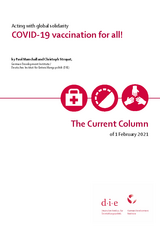The Current Column
Acting with global solidarity
COVID-19 vaccination for all!
Marschall, Paul / Christoph StrupatThe Current Column (2021)
German Development Institute / Deutsches Institut für Entwicklungspolitik (DIE), The Current Column of 1 February 2021
Getting the pandemic globally and permanently under control is key to mitigating its impacts on health, society and the economy. This requires that a large proportion of the global population need be vaccinated against COVID-19 as quickly as possible, which necessitates global solidarity between states in the global North and global South and between societal actors worldwide. Global problems need global solutions. In the case of COVID-19, we are currently a long way from achieving this.
Supported by public-sector donors, several pharmaceutical companies have developed vaccines rapidly. Wealthy states secured ample stocks of vaccine early on to protect their own populations. Obtained via right of first refusal, these stocks are sufficient to vaccinate their own citizens many times. Canada, for example, obtained enough doses to vaccinate each Canadian five times. However, numerous poorer states, such as those in Africa, have been losing out until now. This will only further prolong the economic and social consequences of the pandemic, such as rising inequality and poverty. Even if wealthier countries should manage to provide their own populations with optimal quantities of the vaccine by late June 2021, their own economic output could still fall by USD 4.5 trillion. Crises of supply and demand in other nations are leading to losses in the domestic economy.
It is time for wealthy countries to act with solidarity, not only to fulfil their global responsibility, but also in their own best interests. Surplus vaccination doses and those purchased with right of first refusal should be donated to poorer nations or passed on at significant discount. Efforts are being organised to this end by the vaccination initiative COVAX, launched by the World Health Organization (WHO) among others. COVAX aims to secure sufficient doses of the vaccination to enable at least 20 per cent of the populations of the poorest countries to be immunised by late 2021. However, COVAX requires some USD 7 billion to achieve this. The initiative currently only has USD 4 billion at its disposal. This funding gap needs to be closed as quickly as possible.
Ensuring that the vaccine can be produced by manufacturers in countries in the global South is essential to guarantee rapid distribution throughout poorer nations. Manufacturing vaccines under licence is relatively simple. However, de facto patent regulations restrict production by other manufacturers. Indeed, the European Union (EU), the United States and other industrialised nations rejected a proposal for the suspension of patent protection at the General Council of the Word Trade Organization (WTO). South Africa and India had submitted the proposal on behalf of over 100 states, including Kenya and Nigeria. There are several well-known examples of the positive effects of relaxing patent protection legislation. The TRIPS patent agreement that has been relaxed 20 years ago saved for example many lives in the fight against HIV/AIDS.
Vaccine production is not the only activity that needs to be carried out on a global scale; numerous poorer nations also require global support in order to manage the logistics of delivering the COVID-19 vaccines. A recently published study shows that just 10% of the basic health facilities in the global South have adequate refrigeration infrastructure. There is an urgent need for actors of technical and financial development cooperation to support partner countries with this logistical challenge.
Even if vaccines are available in a given country, people show differing levels of willingness to receive them. Living far away from health centres can be a major reason for not getting vaccinated, given the difficulty and cost of reaching the health centres. Corresponding studies in Africa show great disparities in people’s willingness to have the vaccine, from 90% of survey respondents in Ethiopia to 65% in Senegal. Information campaigns to counteract fears of vaccination and possible side effects would seem especially important for at-risk groups. The Social Cohesion in Africa project being conducted at the German Development Institute / Deutsches Institut für Entwicklungspolitik (DIE) is currently investigating the specific factors affecting people’s willingness to be vaccinated.
Three key components are important when it comes to getting the pandemic under control globally and permanently: strengthening financial assistance for the COVAX initiative, manufacturing vaccines locally and supporting vaccine distribution. This can only be achieved through global solidarity between states in the global North and the global South. The global North would itself benefit from this, as existing COVID-19-related restrictions in global South countries are leading to major losses in the global economy. The international development cooperation sector has a particular responsibility here, especially in nations severely affected by the pandemic. Failure to curb COVID-19 in the global South would inevitably result in losing grounds of achieving the Sustainable Development Goals (SDGs).


